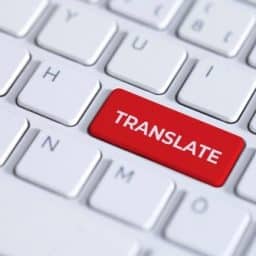

One unfortunate word in a translation turns a brilliant campaign into a marketing disaster. International brands face numerous pitfalls, including translation errors. Although they may seem harmless, their impact on a company’s reputation and financial performance is staggering.
Translation errors are mistakes made when transferring the meaning of text from one language to another. These blunders result mainly from literal translations, a lack of cultural understanding, or linguistic complexities. They produce confusing messages that are humorous or offensive. Discover some of the most notable mistakes in marketing history.
Contents
Why should you avoid marketing translation errors?
Even though companies spend enormous amounts planning their marketing strategies, unfortunate translation errors still occur. These mistakes expose the brand to risk. At best, they become the subject of jokes. At worst, severely damage the company’s reputation.
Translation errors affect how a brand is perceived by local consumers. Negative reactions to unfortunate translations and incomprehensible messages lead to a loss of trust. When a brand appears to disregard the local culture and language, customers notice it easily.
The effects of such mistakes vary from unintended humour to consumer resentment. Occasionally, it might be just a misfired slogan that takes on an unwanted meaning in another language, or a visual design that is poorly received. To counteract, since the beginning, invest in professional services.
Why do translation errors occur?
A poor understanding of the local culture and language destroys the marketing message. At best, the company simply fails to reach its customers because it is not properly understood. A flawed marketing strategy that ignores local customs and dialects leads to misinterpretations.
Although automatic translation has significantly improved, this technology cannot still grasp the context. Machine translation is useful for understanding the general meaning of a text, but rarely meets the needs of international marketing.
Some companies skip testing to save time and money. Rushing products and services to new markets without this crucial step often results in rejection by local consumers. Testing ensures that the message resonates with the audience.
Translation mistakes have significant repercussions. They lead to embarrassment, brand damage, and financial loss.



HSBC
In 2009, HSBC’s campaign slogan Assume Nothing was translated in various international markets as Do Nothing, which led to confusion and undermined the message. To correct the mistake, the bank had to spend approximately $10 million on a rebranding campaign.
Pepsi
During the 1960s, Pepsi’s slogan Come Alive With Pepsi was translated for the Taiwanese market as Pepsi Will Bring Your Ancestors Back From the Dead. This translation was culturally inappropriate and disturbing. It deviated from the intended festive connotation of the slogan.
Ford
In Belgium, Ford’s campaign intended to highlight the quality of their cars with the slogan Every car has a high-quality body. However, it was translated as Every car has a high-quality cadaver. As you can imagine, it was quite morbid.
KFC
When KFC entered the Chinese market in the late 1980s, their famous slogan Finger-Lickin’ Good was translated as Eat Your Fingers Off. It distorted the intended appetising effect of the slogan.
Coors
The American beer brand Coors translated its Turn It Loose slogan into Spanish, where it was read as Suffer From Diarrhoea. This translation error turned a slogan meant to convey freedom and spontaneity into something off-putting.
American Motors
In the 1970s, American Motors named a mid-sized car Matador, which was intended to evoke images of bravery. However, in Puerto Rico, the name translates to killer.
Mango
In 2014, the Spanish fashion brand Mango referred to a line of jewellery as slaves in France. While esclava (slave in English) refers to a type of bracelet in Spanish, the direct translation in French evoked images of slavery and oppression. It leads to a public relations issue.
Parker Pen
When Parker Pen marketed their ballpoint pens in Mexico, they wanted to communicate that their pens would not leak and embarrass the user. However, the company mistakenly used the word embarazar (to impregnate) instead of avergonzar (to embarrass). The slogan was translated into Spanish as It won’t leak in your pocket and make you pregnant, which was confusing but humorous.
Sharwoods
In 2003, UK food manufacturer Sharwoods launched a new curry sauce named Bundh in the UK. Unfortunately, they did not realise that bundh sounded like the Punjabi word for arse. This translation error led to a lot of amusement and discomfort among Punjabi speakers.
Honda
When introducing their new car model Fitta in Nordic countries, Honda encountered a significant cultural oversight. In Swedish, Norwegian, and Danish, fitta was an old, crude term for female genitals. Realising the mistake, Honda renamed the car model to Honda Jazz for some markets.
Osram
A German company Osram did not localise its name before entering the Polish market. The name Osram closely resembles a vulgar term in Polish, which could have led to negative associations. However, despite this oversight, the company has performed well in the Polish market.
Coca-Cola
When first entering the Chinese market, Coca-Cola translated their name phonetically to something that sounded like kekoukela, which unfortunately meant “bite the wax tadpole” or “female horse stuffed with wax” in Chinese. After realising the error, Coca-Cola researched 40,000 Chinese characters and found a close phonetic equivalent, kekoukele, which means “happiness in the mouth”.



Electrolux
When Swedish vacuum manufacturer Electrolux entered the U.S. market, they used the slogan Nothing sucks like an Electrolux. While intended to highlight the vacuum’s power, the phrase also colloquially implied that no other product was as bad as theirs.
Mercedes-Benz
When Mercedes-Benz entered the Chinese market, they chose the brand name Bensi, which unfortunately translates to “rush to die” in Chinese. The company quickly changed the name to Benchi, which means “run quickly as if flying”, to suit the market better.
American Dairy Association
The famous Got Milk? campaign was translated into Spanish for the Mexican market as ¿Tiene leche? which means Are You Lactating?. This translation was quite inappropriate.
Braniff Airlines
In a promotional campaign, Braniff Airlines translated their slogan Fly in Leather into Spanish as Vuela en cuero, which is quite similar to vuela en cueros interpreted as “fly naked.” This translation error led to unintended humorous and embarrassing interpretations.
Nissan Pajero
The Japanese automobile manufacturer Mitsubishi had to change the name of one of its star models, the Pajero, after introducing it in the Spanish-speaking market. Its name was too vulgar for a new market. Mockery soon followed, and the company renamed this SUV as Mitsubishi Montero in Spain, South America, and the USA.
These examples underscore the importance of cultural sensitivity and the need for professional translation services in international marketing.



Marketing translations: How do you do it right?
Automated content translation destroys the entire marketing message. Before entering foreign markets, seek the help of professionals. Hiring a native speaker of the target language will help to avoid common mistakes.
Your communication should be tailored to the culture and expectations of local markets. Our translation agency specialises in marketing translations. We offer top-level services that have a significant impact on brand image.
We employ qualified translators who thoroughly understand the specifics of each market. Your advertising campaigns, promotional materials, and websites will sound convincing. Contact us to learn more.
Images generated by AI.















